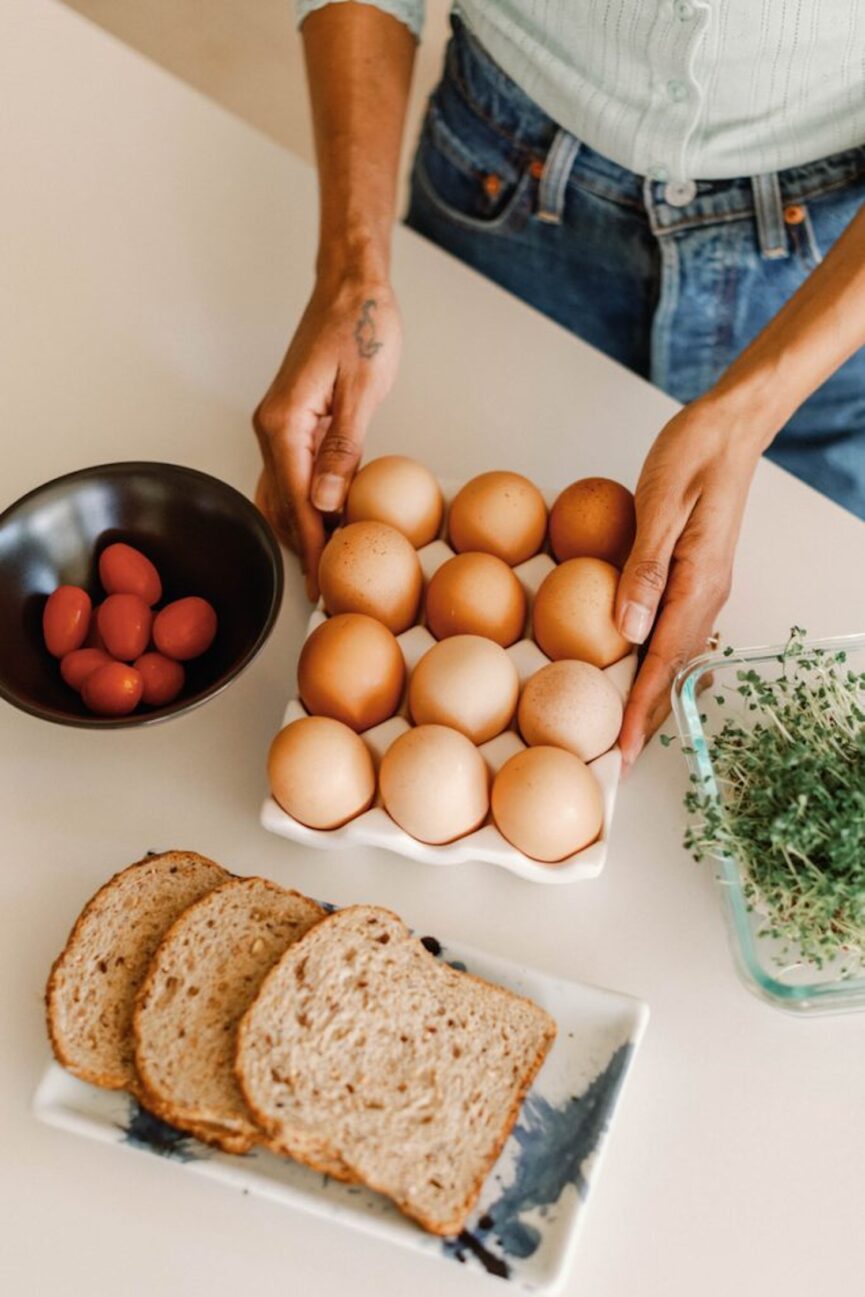When it comes to food, everyone takes a different approach. How—and what—you choose to eat is unique (or at the very least, it should be!). From food preferences to religious traditions and habits, many factors influence your grocery basket. And this is a beautiful thing. We’re bio-individuals, after all. In many ways, what you eat is a celebration of your lifestyle, beliefs, and goals. Accessibility and appetite play a part, too. That said, many of us have lost our ability to have a normal relationship with food. In turn, we embody a fearful and resentful attitude toward eating. Hello, diet culture. Today, we’re diving into all things healthy eating habits. These are practical, sustainable, and—best of all—approachable.
Feature image by Michelle Nash.



Wellness Is Not One-Size-Fits-All
When it comes to living a healthful life, it’s the things we do daily that support longevity. Our routine actions make us well. Our habits, in essence, are our wellness. These are the things that encourage a long, vibrant life. But it’s important to remember that wellness is not one-size-fits-all. In fact, it’s the opposite.
Wellness is about accepting who you are—as an individual—in order to become the best version of you.
It’s understanding how sleep, movement, and food affect your metabolic health, hormone health, and gut health. Everything is interconnected. There are many ways to prioritize wellness, including learning how to build healthy eating habits.
How to Build Healthy Eating Habits
Below are 21 ways to build healthy eating habits. These are a culmination of philosophies and science-backed principles to guide your eating choices. Of course, take these with a grain of salt! Remember: You know your body best.
1. Embrace Bio-Individuality
You’re a bio-individual. This means there’s no universal approach to health and nutrition. Instead, we’re all unique in our biological makeup. You have unique nutritional needs and lifestyle factors that influence your eating choices. Your requirements aren’t the same as mine—nor your partner’s. Embrace this! We can’t expect to be our healthiest selves by following the same rules, paths, and expectations of others. Use this to your advantage. When it comes to building healthy eating habits, honor your body’s uniqueness.
2. Listen to Your Body’s Feedback
For decades, we’ve been bombarded with processed foods, misinformation, and deceptive marketing. In turn, we’ve lost touch with what our bodies need. We don’t know what it’s like to actually tap into hunger cues and cravings. We’re taught to suppress our appetite, restrict our intake, and count calories. None of these behaviors are helpful or healthy! How to build healthy eating habits begins with listening to your body’s feedback. Does eating a certain ingredient (or food) make you feel bloated, lethargic, or unwell? That’s your body giving you feedback. Listen to these internal cues.
3. Consider Your Daily Habits
As mentioned, it’s our daily habits that make us well. A yearly juice cleanse (or strict 30-day diet) isn’t the solution to your problems. These things may help, temporarily, but we want to think of our health from the lens of practicality and sustainability. What you do today, and most days, is what builds a healthy future. Said differently: healthy eating habits are a daily commitment. That doesn’t mean you need to eat healthfully every day of the week, but it means that most of the time, you’re committed to eating well in order to feel your best.
4. Experiment With Different Cuisines
Variety is the spice of life. Healthy eating habits include diversifying your plate (and palate). Food is a manifestation of culture, traditions, and history. If we eat the same things, over and over again, we’re quick to fall into a rut and eventually get burned out. Ever eat the same bowl of oatmeal every day only to get totally sick of it? Same. Nudge yourself out of your comfort zone and try new recipes. We’ve got plenty of inspo to churn your creative gears.
5. Choose a Variety of Colors
Eating the rainbow automatically encourages healthy eating habits. Plus, you’ll delight yourself with new ingredient preferences. As you diversify, watch your food cravings evolve! Eating more produce is always a good idea—period. Along with increasing your fiber intake, more fruits and veggies will holistically improve various areas of your health.
6. Eat With The Seasons
One of the best ways to build healthy eating habits is to eat with the seasons. You’ll be inspired to support your local farmers and enjoy peak-of-season goodness. Your immune system will thank you, too. With optimal growing conditions and more sun exposure, you’ll consume higher levels of antioxidants—like vitamin C, folate, and beta-carotene.
7. Don’t Forget Herbs
Tiny but mighty, their benefits stretch a mile long. Herbs are an easy and convenient way to add flavor, color, and nourishment to dishes (without adding extra fat, sugar, or salt). Many herbs are loaded with a range of health benefits. Try adding mint, parsley, cilantro, basil, dill, or chives to your next meal!
8. Sprinkle on Spices
In addition to being flavor enhancers, did you know that spices make meals more satisfying? And one of the ways to keep your blood sugar balanced is by eating satiating foods. Think: avocados, eggs, almonds, and sweet potatoes. But to get more bang for your buck, consider adding spices like cinnamon and turmeric. Studies show these aid in blood sugar balance.
9. Honor Your Food Cravings
Rather than demonize cravings (because everyone experiences them), it’s best to acknowledge cravings instead of fighting them off. Most experts agree that you should honor your cravings and enjoy every bite. After all, restriction can easily lead to deprivation and binge-eating. Keep in mind that your food cravings are a window into your health and can expose possible nutrient deficiencies.
10. Lean Into Your Appetite
Along with honoring your cravings, lean into your appetite. Are you eating enough food? The irony is that while diet culture is obsessed with telling us we’re eating too much, many of us aren’t eating enough. When it comes to building healthy eating habits, the goal is to nourish—not deprive. Having a robust appetite is a good thing. In fact, it often indicates a strong metabolism.
11. Consider Your Circumstances
In order to consistently nourish your body, you need to take a sustainable approach. What’s realistic for you and your lifestyle? Consider your circumstances. Do your family obligations allow for basic meal prep on Sundays? Does your food budget allow for choosing organic vs. conventional produce? How to build healthy eating habits requires you to meet yourself where you’re at. Do what’s doable, not what feels stressful or overwhelming.
12. Swear Off The Diet Train
I get it: This is easier said than done. But in order to build healthy eating habits, you need to shake hands with dieting and move on. If you want to have a peaceful, intuitive relationship with food, it’s time to hop off the diet train. Here are a few book recommendations to get started:
13. Keep Blood Sugar Balanced
An important habit—when it comes to establishing healthy eating behaviors—is to keep blood sugar balanced. We’ve talked about this before, but balanced blood sugar is the key to happy hormones, better sleep, improved energy, and more. Knowing how to balance your blood sugar will influence your food choices, thus influencing your eating habits.
14. Follow This Plating Formula
If you’re new to creating a nourishing, satisfying meal, look no further than this plating formula. It’s the secret to building healthy eating habits.
General framework for meals:
- 1/2 plate of non-starchy vegetables: leafy greens, broccoli, cauliflower, tomatoes, eggplant, mushrooms, asparagus, summer squash, etc.
- 4-6 oz high-quality protein: about one fist-size amount
- 1 serving starchy carbohydrates: 1/2-1 cup potatoes, rice, quinoa, pasta, etc.
- 1-2 servings healthy fats: avocado, olives, nuts, seeds, olive oil, tahini, etc.
15. Opt for Healthy Fats
Often an afterthought, don’t neglect healthy fats! These help balance blood sugar. Good fats can lower your risk for heart disease, help lower cholesterol, aid in satiation when paired with a complex carbohydrate (vegetable, fruit, or whole grain), and are necessary for hormone production.
A few favorites:
- full-fat cheese
- avocados
- extra-virgin olive oil
- olives
- walnuts
- wild-caught salmon.
16. Stay Hydrated
Don’t forget to stay hydrated! Interestingly, some people confuse thirst and hunger, often mistaking the former for the latter. Clinical studies have shown that 37% of people mistake thirst for hunger (because thirst signals can be weak). Although we’re focusing on how to build healthy eating habits, don’t neglect your water consumption. Water-rich fruits and veggies count, too! As a good rule of thumb, learn to read your urine.
17. Keep A Well-Stocked Pantry
A well-stocked pantry (and freezer!) makes healthy eating a breeze. Be sure to keep your ingredients stored properly for quick and easy weeknight dinners. When possible, stock your pantry with 100% whole grains, low-glycemic flours (like almond and coconut), and healthy sugar alternatives.
18. Swap Out Industrial Seed Oils
These sneaky oils are making us sick. Naturally, they’re not supportive of building healthy eating habits! Industrial seed oils are highly-processed oils, extracted from soybeans, corn, rapeseed (the source of canola oil), cottonseed, and safflower seeds. They’re devoid of nutrients and calorically dense. Instead, opt for nourishing oils—coconut oil, extra-virgin olive oil, sesame oil, and pure avocado oil.
19. Limit Processed Foods
Along with swapping out industrial seed oils, aim to limit processed foods. Replace them with real, whole foods. Processed foods don’t aid in building healthy eating habits because—for the most part—they lack substantial nutritional value. They also often include unhealthy levels of added sugar, sodium and fat. These ingredients make food taste better (re: addicting), but they lead to health problems, gut issues, and more.
20. Turn Off Technology
Want to stop mindless eating? Consider turning off technology while you eat. Leave your phone in a different room—or dine al fresco! Just like when you eat in front of your laptop (guilty as charged), using a device while munching on your favorite snack foods can lead to overeating. Why? You’re distracted and can lose track of just how many handfuls of chips you’ve devoured. How to build healthy eating habits includes being mindful of your eating environment.
21. Dine With Friends
Last but not least, dine with friends. There are so many benefits to this. By eating with others, you can enjoy quality time together, share food traditions across generations and cultures, explore new healthy foods that you might not normally try, and more. Dining with others can radically improve your relationship with food and your body. Cheers!






